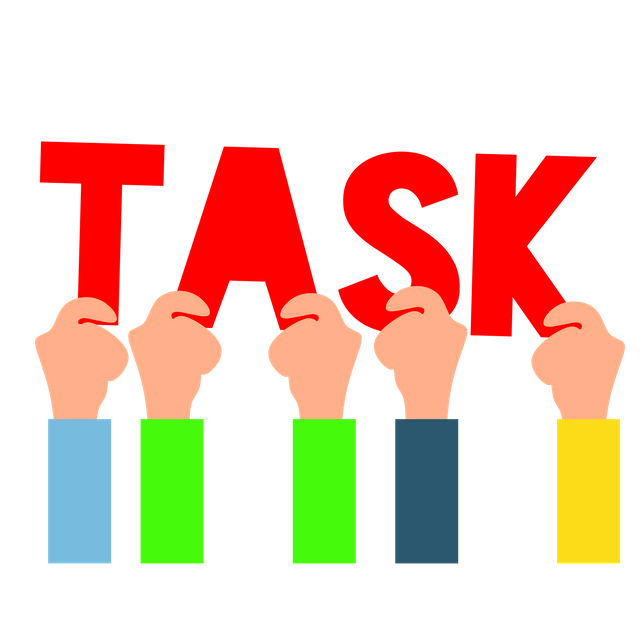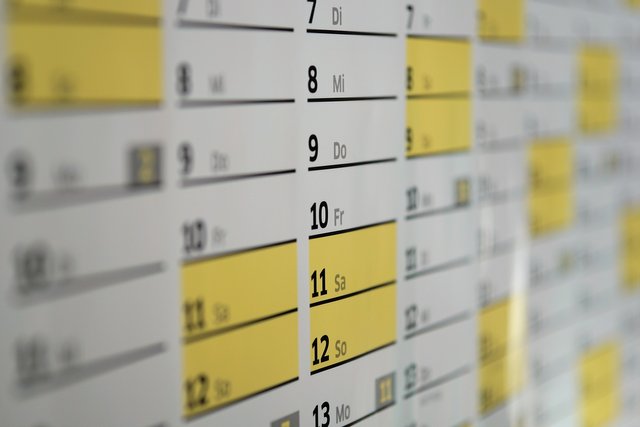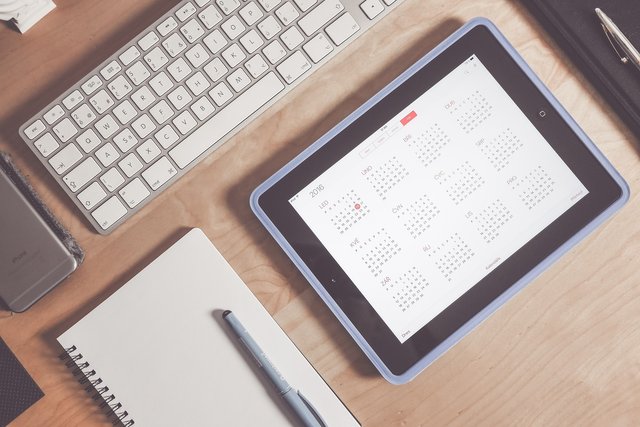The most effective method to Utilize a Calendar and Task Manager Together
How profitable you are is generally an aftereffect of the individual efficiency frameworks that you've chosen to execute. These frameworks are both autonomous and reliant, so it's vital that you know how they are associated. Having the capacity to dispense with the grinding between your own frameworks is essential in the event that you need to gain important ground on your objectives. In this post, we will demonstrate to you best practices to use two of the more basic individual frameworks by utilizing an assignment director and logbook together viably.

Image Source: Pixabay
General Reasoning
Before you can begin making a move on these assignments however, you should comprehend the particular parts every one of these apparatuses plays in your work process. This is fundamental as when these instruments can uncover the fitting errand at the suitable time/put – however just in the event that you see how to legitimately utilize them together.
A task manager and a schedule serve quite certain (and altogether different) capacities:
Task Manager – demonstrates to you the assignments you have to finish in a way that is noteworthy. Great assignment chiefs enable you to channel your errands by venture, setting (the apparatus, place or thing you have to finish the undertaking), due date, or even mental state (i.e. errands that you have to complete however don't require a considerable measure of intellectual competence and you can do when you have low-vitality). Great assignment chiefs enable you to utilize extra criteria to rapidly move what things really show up on the rundown of things for you to do at any given minute.
Calendar – demonstrates to all of you the time touchy things that you completely should do at a particular time (i.e. a work meeting or physical checkup). These are not things that you ought to do, these are things that you should do. They are mission basic. You would prefer not to mess your logbook with things that are not significant as this will simply influence you to doubt your timetable. When you see something on your date-book, you should realize that "I completely need to do this thing as of now, regardless."
This implies while a few undertakings will appear on your schedule, not every one of them will. They shouldn't consequently show up there. While truly all that you have to complete must be done inside the setting of time, that doesn't mean you should stack up your date-book with errands consistently.
Shouldn't something be said about the task manager? What do I utilize that for?
 Image Source: Pixabay
Image Source: Pixabay Your task manager is a priceless device for demonstrating to you what you should take a shot at when. This could be something as straightforward as a rundown composed on a napkin, however in the event that utilization an innovation based device like OmniFocus you can really use your undertaking director to show just the assignments that you can deal with at any given minute. You can channel your undertakings by venture, by setting, or even due date – as long as you entered the suitable data when you made the errand in any case.
With a specific end goal to utilize your task manager successfully, there are a few things I ought to characterize:
Task – This is a solitary thing that you should complete. An undertaking is as straightforward as it can be and can't be separated any further (i.e. edit article)
Project – This is anything that you should complete that requires different advances (i.e. compose article, which could be separated into composing the content, finding the pictures, editing, and so on.)
Single-Activity Rundown – This is a "venture" that contains singular undertakings or things that are disconnected (i.e. a basic need list)
It's critical to have a firm comprehension of these center ideas previously you begin catching all that you have to do into your errand supervisor. The capacity to recognize when something is really a task and afterward separate it into noteworthy advances is an imperative aptitude, and one that you will utilize while catching data.
With a specific end goal to ensure that the right data gets into your undertaking chief, you have to ensure you answer two or three inquiries when entering your errands:
What's going on here? – Noting this inquiry will decide if this is really an assignment or not. For instance, is it something you'll require later? At that point it ought to most likely go into a reference document (like Evernote. Possibly it's not vital any longer and can simply be tossed in the waste (an astonishing measure of the email you get really has a place here). In the event that it truly is an errand, at that point we can keep on entering it into our undertaking administrator yet there are a couple other qualifying questions we'll have to ask first. You'll need to burrow somewhat more profound and choose if it's sufficiently enormous to be its own particular venture, if it's a piece of an officially existing undertaking, or if it's a straightforward errand that can be added to a solitary thing list.
Would it be advisable for me to do this? – Expecting this is an errand, the subsequent stage ought to be to decide whether the undertaking is extremely worth doing and affirming that we truly are the opportune individual to do the assignment. Commonly we go up against things we shouldn't do in light of the fact that we get a kick out of the chance to feel critical. You should be straightforward with yourself, and on the off chance that another person should do this errand at that point don't sign for the bundle.
At the point when do I have to do this? – Simply tossing undertakings into your assignment chief won't help you really complete things. You need to choose when you need to do this errand, and after that you need to choose if there truly is a hard due date (these are NOT a similar thing). You need to maintain a strategic distance from subjective due dates since it can be deadening to see a pack of past due errands that truly aren't late when you open up your undertaking chief. The expression for this is "errand overpower" and these false positives makes you not confide in your framework. What you ought to do rather is utilize concede dates or begin dates at whatever point conceivable. These enable you to see when an undertaking is accessible to be taken a shot at however doesn't shout at you when a self-assertive due date passes. For instance, I should need to begin arranging the family excursion we've been discussing however there is certifiably not a particular date that I totally should do this by. For this situation, I'd utilize a concede date yet not a due date.
What do I require with a specific end goal to do this? – As indicated by the GTD work process, this is the unique situation. It's the device, place or individual you require keeping in mind the end goal to really complete the thing. For instance, in the event that you need to call somebody, you may utilize "Telephone" as a specific circumstance. This may appear to be extremely straightforward, however it's vital to distinguish this when you are preparing your email as it will spare you a great deal of time attempting to make sense of it later. Any potential contact you can wipe out when it's a great opportunity to really do the assignment expands the odds that you will finish and do it.
The way to dealing with your task manager together with your schedule is to audit it in any event once seven days to ensure everything that ought to be on your logbook is there. That is an ideal opportunity to experience your undertakings and see which errands require consideration, which can be erased, and which ones get elevated to the logbook. Keeping up your errand supervisor is critical in light of the fact that you will depend on this data when arranging your days and weeks on your date-book.
When all is said in done, you'll utilize your task manager to design the work that you need to do however a large portion of these things won't really wind up on your timetable. We cover this theme broadly inside our private preparing library the Dojo.
So what ought to go on my date-book?
There are a three unique sorts of occasions that ought to go on your schedule:Arrangements/Gatherings – These are physical spots that you should be at a particular time (i.e. a dental practitioner arrangement or a gathering at work)
Time-particular assignment – These are errands that completely should be done at a particular time (i.e. lift kids up from school)
Time squares – These are squares of time put aside to achieve vital yet not pressing undertakings (i.e. setting off to the exercise center)
The act of time-blocking (making squares of time to an achieve your imperative errands) can be an exceptionally powerful approach to reliably make a move on the essential undertakings that tend to become lost despite a general sense of vigilance when you get occupied. I for one utilize the act of time-shutting to set arrangement out each hour of my whole week:
 Image Source: Pixabay
Image Source: Pixabay You don't need to design out your whole week on the off chance that you would prefer not to, yet I think that its accommodating to have a "Canvas" logbook where I know where I should be and what I should do from an abnormal state point of view. Ever hear the expression, "time is cash?" This is the approach I take to dealing with my date-book. The standard here is that your logbook is much similar to your funds, and simply like each dollar needs a vocation so does each hour of your day. That doesn't imply that I'm working from sun up to sun down, yet it implies I've isolated my day such that I've made the space to complete the things that are extremely essential.
What sets aside a few minutes blocking so powerful is that while your date-book may look extremely full, practically speaking what you'll discover (at any rate as far as I can tell) is that you really have all the more spare time. Much of the time, I'll put aside 2-3 hours to take a shot at an engaged assignment (like written work this article) and find that since I'm rationally arranged to make a plunge and work on it I'll really complete it sooner than I foreseen. This gives me some extra spare time that I can use to either unwind for a smidgen and energize before my next time square or begin from the get-go my next undertaking.
A standout amongst the most vital time squares you can make is for center time. Center time is vital in light of the fact that on the off chance that you don't make the ideal opportunity for it, it will most likely never happen. In the event that you don't cut out time from your day to center around your most vital work, you will presumably get sucked into essentially reacting to the pressing solicitations of others. In the event that concentration time truly is a need for you, you have to make the space for that movement to happen.
This same rule can apply for different things you need to make space for also. Possibly notwithstanding center time it's a need for you to get to the exercise center each day. On the off chance that that is the situation, don't hesitate to put that time hinder on your timetable. By doing this, you limit the shot that something different will come up amid that day and age since you've officially dedicated to being some place. Making that space for your imperative exercises to happen exponentially expands the odds that you will finish and really do them.
Some other time square I utilize is the "Support" time square. I utilize this opportunity to browse my email and tidy up any support assignments I have lying around. For instance, I may utilize this opportunity to discharge my OmniFocus inbox or tidy up my Work area on my PC if it's muddled. There's constantly little errands like this that should be done, and I've discovered that having a cradle hinder toward the start and end of my work day encourages me adhere to these standard upkeep customs all the more frequently.
I additionally have a three hour "Breakout" obstruct that I received from the multi Week Year. I utilize this opportunity to energize and separate from work for a spell, which is genuinely troublesome for me to do. Yet, that just demonstrates to me that I have to do it considerably more, as my cerebrum is continually contemplating the following article I could be composing or digital broadcast scene we will record. On the off chance that I set aside the opportunity to separate however, my thoughts are typically better and the nature of what gets delivered is much higher.
With regards to time-particular errands, you ought to consider your date-book blessed ground. Nothing goes on your date-book except if it's an unquestionable requirement and is time delicate. You totally need to abstain from putting assignments on your timetable that have irregular or discretionary due dates. This will top off your schedule superfluously. For instance, you need to book an excursion to Maui, however you do not understand yet when you need to do it so you simply put it on Tuesday at 7pm. Attempt to stay away from schedule things like this. Rather, put those things in your daily agenda and after that arrangement when you need to do them.

Image Source: Pixabay
Instructions to Utilize Your Date-book

The basic date-book is an all-powerful instrument that has a tendency to escape underneath all the garish errand supervisors, efficiency frameworks and setting particular cell phones applications that we have these days.
The stunning truth is that most business experts basically don't know how to exploit their timetable applications – regardless of them being practically default on each stage being used (work area, telephone), and simple to set up.
Considerably all the more stunning, is that I @glory001 has never composed an article on fundamental establishment level timetable/logbook administration before – this article will change that.
I'll be making the supposition that you will utilize your logbook between your work area and telephone – some match up arrangements will be specified underneath.
Speedy Rundown

- Programming and Synchronize. We would love to have the capacity to not need to specify this (it should simply work!), however the innovation isn't exactly there yet.
- What goes in your timetable, and how to recognize arrangements from errands.
- Organizing your timetable deliberately, for most extreme proficiency.
- The key utilization of updates and how you can (ab)use them to frame new propensities.
- Making everything fit together.
Programming and Match up
 Image Source: Pixabay
Image Source: Pixabay As specified, the way that we even need to talk about match up and programming arrangements is something of a shame.
In Macintosh's biological community we exceedingly propose you stay with iCloud, which will pull information from your Macintosh to your iPhone to your iPad essentially flawlessly. It gets the periodic hiccup perhaps a few times per year, however it's generally bother free.
We don't utilize Windows or Android (much), however from chatting with clients on those stages matching up is by all accounts an interwoven of arrangements. The least demanding arrangement it would appear is to utilize Google Schedule and their match up arrangement, which goes something like this:
- Viewpoint matches up to Google Timetable (on work area).
- Google Timetable matches up to schedule application (on telephone).
As a reward say for Apple clients, while the default Schedule applications are really great, we like:
- BusyCal for the work area (simpler to use than the standard schedule application).
- WeekCal for the iPhone (best timetable application on the iPhone by a long shot).
- We're yet to locate a decent trade for the schedule application on the iPad (damn you Mac for beginning the week on a Sunday). On the off chance that you've discovered one, let us know in the remarks!
What Goes in Your Logbook
Anything that you need to do at a particular time is an arrangement that ought to go in your logbook.You can balance this with undertakings, which are things that should be possible whenever.
The distinction between the two ought to be completely clear – so in case you're uncertain, it would be ideal if you inquire!
The vast majority know about what ought to go in their date-book:
- The time you're grinding away.
- Gatherings at work.
- Social commitment.
- Saved time for things you are taking a shot at ("time blocking").
- Exercise/rec center time.
This can be stretched out further to incorporate things like:
- Planned feast times (particularly in case you're on a specific nourishment design).
- Morning/Night ceremonies.
It appears that a great many people tend to consider what goes in their logbooks as "official" and something that they attempt to stick to. You can utilize this further bolstering your good fortune and plan for time to chip away at vital ventures throughout your life.
Organizing Your Timetable
An extremely normal inquiry that we get is the manner by which inflexibly or in how much detail should individuals structure their date-books.What this comes down to is your life, your way of life and what you have going on. A few people (like me) discover it exceedingly helpful to have supper times, their wake-up routine and work times in their logbook. Other individuals will most likely loathe having those things in there as an indication of what they ought to do.
Make sure not to run insane with lumping down time – we prescribe 60 minutes, or perhaps 30 minutes max as the littlest unit of time you have in your timetable. Any more than that and the measure of micromanagement and mode-exchanging makes it counterproductive.
Time for another stunning truth: the vast majority follow too unbendingly, or too freely to their logbook.
The best approach is to regard your schedule, and to consider it to be your vision of a "perfect day", and to invest your best push to tail it – yet to likewise perceive that occasionally thing crop up and you should be adaptable.
Basically: attempt your best to tail it, and don't pound yourself on the off chance that you don't 100%.
In light of that, here are a few structures you can set up to transform your level of adherence into input:
- Choose what gatherings or arrangements you won't be adaptable on – e.g., gatherings at work, specific social commitment, planned morning/evening customs.
- When you do go astray from your preset timetable, make a note in your diary. On the off chance that it happens a great deal, that is an indication that your timetable needs to change.
A brisk reward tip is to utilize throughout the day occasions to feature noteworthy periods over various days, for instance:
- At the point when a vital business contact is around the local area.
- When you are away on a gathering like NMX. Talking about which, let us know in case you're going and we'll get together!
Vital Utilization of Updates

 Image Source: Pixabay
Image Source: Pixabay Extraordinary compared to other utilizations for your date-book is to set key updates for yourself.
A great many people as of now have cautions turned on for their work area and telephone based timetables, and you can utilize this further bolstering your good fortune by setting yourself alarms for things you need to recollect for the duration of the day.
Here's the manner by which it's finished:
Set up a 5-minute arrangement at the time you need to be helped to remember something.
Information what you should be helped to remember in the arrangement title.
Set the alarm to "on date of occasion" or "at beginning of occasion".
This is inconceivably, extraordinarily valuable and can be utilized to help you to remember things like:
- When you have to drop off/get your clothing.
- Dinner and supplement times, particularly in case you're on a complex healthful arrangement.
- Essential time-blocked occasions, similar to when you ought to do some mind-growing perusing or taking a shot at an imperative side-venture.
For what reason not set assignment cautions by means of something like OmniFocus? Since you can't characterize which particular errands have alarms, and in case you're a complex (or proficient) undertaking coordinator, you likely have 10-20 things due the following day, and cautions for every one of them going off isn't that useful.
Make sure to likewise utilize alarms for "typical" arrangements like social commitment to enable you to arrive on time. Regardless it flabbergasts me the quantity of individuals who can't appraise travel time and set themselves a suggestion to leave home/work the required 15/30/a hour previously to make it to an occasion on time.
Influencing it To work with Everything Else
So where does your date-book fit in your work process?Keep in mind that undertakings go into a devoted errand director or lineup for the day – not your timetable. Furthermore, notwithstanding different programming organizations endeavors, don't attempt to join tho two.
You should take a gander at your logbook toward the beginning of the day to see the pace and mood of your day, at that point as you have to, allude to it for the duration of the day. Similarly as with your errands, likewise investigate the finish of the day and work out what you've done (or not), and see what you're doing to do tomorrow.
Next Activities
- Open up your schedule application.
- Begin arranging your "optimal day" for the up and coming week/month/year.
- Timetable it in.
- Set key updates.
Suggested applications


Image Source: Pixabay
We get asked all the time what applications and administrations we prescribe, so here are a portion of our top choices for utilizing a logbook and an errand chief together:
Task Manager
It appears there's another errand chief out every day. While a considerable lot of them attempt better approaches for taking a gander at or sorting out your undertakings, there aren't numerous attempted and genuine choices that we'd by and by suggest. Here are the ones that have earned the AE seal of value:
OmniFocus – this the highest quality level for singular errand administration as we would like to think. OmniFocus offers includes that other undertaking directors need (like concede dates) and is an extraordinary alternative in case you're intensely put resources into the Apple environment. We especially like the capacity to make your own custom points of view in the Genius adaptation, and I depend on these each and every day to complete my work. What's more, with applications for Macintosh, iOS and Apple Watch, you are never a long way from having the capacity to rapidly observe what undertakings you have accessible at any given time. The main negatives are that OmniFocus is genuinely costly and it's not intended to joint effort so on the off chance that you need to oversee group undertakings you'll have to utilize another device.
Todoist – this is another completely included assignment supervisor, but since it's online it's accessible on basically any registering stage. Todoist doesn't offer a similar level of personalization that the custom viewpoints in OmniFocus do, yet the online stage offers extra highlights like IFTTT and Amazon Resound mix. Todoist likewise can impart undertakings to other individuals, so it could likewise work for community ventures.
Asana – this is another online errand chief with a huge amount of clean. Asana has a UI and is another awesome choice for group errand administration. Asana is additionally refreshed reliably with new alternatives and highlights, such as revealing choices and a sheets design that intently looks like an adjustable kanban board arrange.
2Do – this independent Macintosh and iOS application has developed significantly since dispatch, and has developed into an extremely strong undertaking administration framework for the individuals who utilize Apple items. It shares a considerable measure of an indistinguishable usefulness from OmniFocus, however incorporates some extra highlights (like labels) that can really improve it an even alternative if your mind works that way. A portion of our most in-your-face Dojo individuals rave about it as well.
Trello – this web application is based on the idea of kanban sheets and gives an altogether different method for taking a gander at your assignments from most errand chiefs. You'll presumably either cherish it or loathe it, yet it's a sold application for the individuals who incline toward a major picture perspective of what they need to do.
Updates – the inherent Updates application can likewise work as a fundamental daily agenda. It does not have the great hierarchical highlights of a portion of the other errand supervisors on this rundown, yet in addition offers framework level reconciliation which makes it unbelievably simple to catch things ("hello Siri, remind me review my musings on undertaking directors and timetables").
Logbook/calendar
Logbook applications are more precarious as there are a few various types of schedule administrations accessible (Google, iCloud, Trade, and so forth.). Much like email specialist organizations and email customers, what application you utilize may be restricted by what sort of calendaring administration you're utilizing to continue everything in a state of harmony.
BusyCal – this is the OmniFocus of calendaring applications. It's quite expensive, yet offers highlights like customization alternatives for the distinctive perspectives (day by day, week after week, and month to month) and an information board that permits you rapidly see and alter extra occasion subtle elements. BusyCal likewise offers Microsoft Trade bolster.
Fantastical – this 2015 Apple Configuration Honor victor which has a great regular dialect parser which enables you to rapidly make occasions and updates, yet isn't as solid as BusyCal as we would see it. It looks incredible and the iOS applications are wonderful, yet in the event that you were to pick just a single calendaring application BusyCal still gets our vote.
Timepage – this is a newcomer on the iOS stage and is put out by Moleskine (the general population who make the paper journals), and it is a totally wonderful application. Easily overlooked details like swiping between hand-drawn symbols for favored travel strategy when setting up An opportunity to Leave warnings as opposed to choosing from a rundown give the application character and identity. Timepage additionally has a Partner include which can be utilized to send you rain cautions, give you a day by day preparation, reveal to you what's forthcoming, when you have to leave, and even remind you to catch up with individuals you've met with. We need to thank the individuals in our private gathering for this proposal.
Date-book – the inherent logbook application likewise takes care of business with regards to dealing with your timetable, and again offers framework level joining that is absent with third-part date-book applications ("hello Siri, plan a group meeting on Monday at 3pm focal time").
Conclusion

It's critical that you pick your instruments precisely so they encourage your work, not obstruct it with extra alternatives and unpredictability. By and large, stay with basic instruments until the point that you achieve the point where you require the application you're utilizing to offer extra highlights ("I wish my errand supervisor or logbook could do X") and afterward redesign. On the off chance that you needn't bother with the extra highlights, avoid the extra multifaceted nature (and extra erosion) that more accompanies more muddled apparatuses and applications.
References
personal productivity system
NMX
Google Calendar
12 Week Year
OmniFocus
The Best Method for Organizing Your Files, Folders and Documents
Step by step instructions to Accomplish Your Objectives with Any Task Management System

upvote for me please? https://steemit.com/news/@bible.com/2sysip
Incredible article.
I concur that utilizing both is the most ideal approach. The errand supervisor is the primary place to keep your regularly changing Plan for the day, while your date-book is better to schedule significant undertakings.
I for one like Evernote for my Daily agenda, in spite of the fact that there is one drawback. It requires me a little investment to explore to the rundown, which makes a psychological obstruction to keep me from doing it all the more frequently.
Do you locate that a portion of the errand supervisors you specified help settle that issue since they have only one principle work, though Evernote transforms into a behemoth of archives, to-dos, bookmarks, and so forth.?
You said the logbook being blessed, yet it appears to be just about a little enlarged, at any rate to what I'm utilized to. I normally just put Arrangements, Occasions and Day particular data (as a throughout the day occasion) on my timetable. Having the due date there gives you a pleasant review of due dates, yet so forecasts in omnifocus. Having the due date on the date-book really feels somewhat odd since it may not require any activity at all from the client, as whatever had a due date might've been finished days back.
I attempted concentration time for my college examines, yet I truly suck at keeping them. Thusly I hate putting it on my schedule, however it's extremely an issue of teach.
Awesome article, it's an extraordinary inside and out setup of date-book + todo!
Hello! I find your post valuable for the wafrica community! Thanks for the great post! @wafrica is now following you! ALWAYs follow @wafrica and use the wafrica tag!